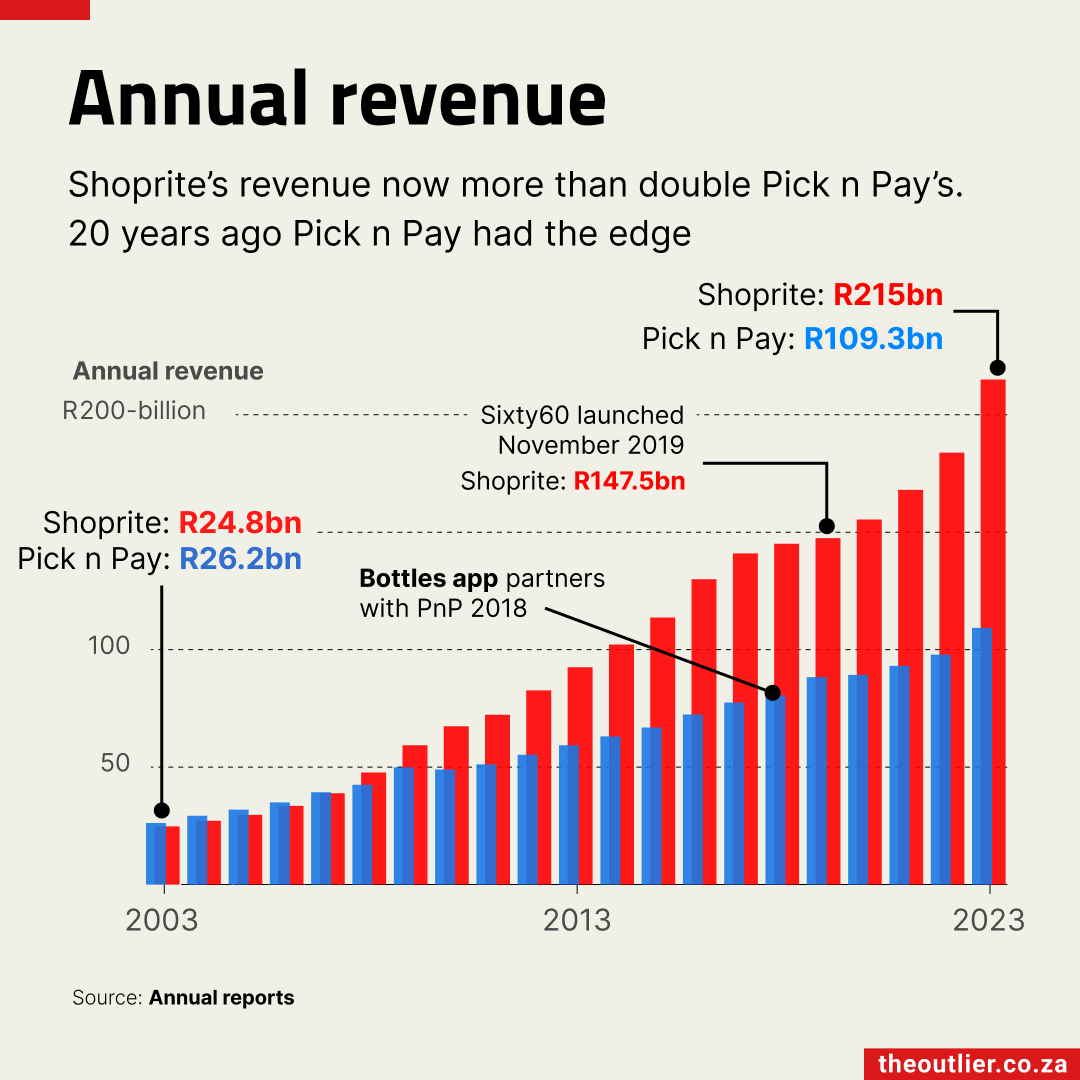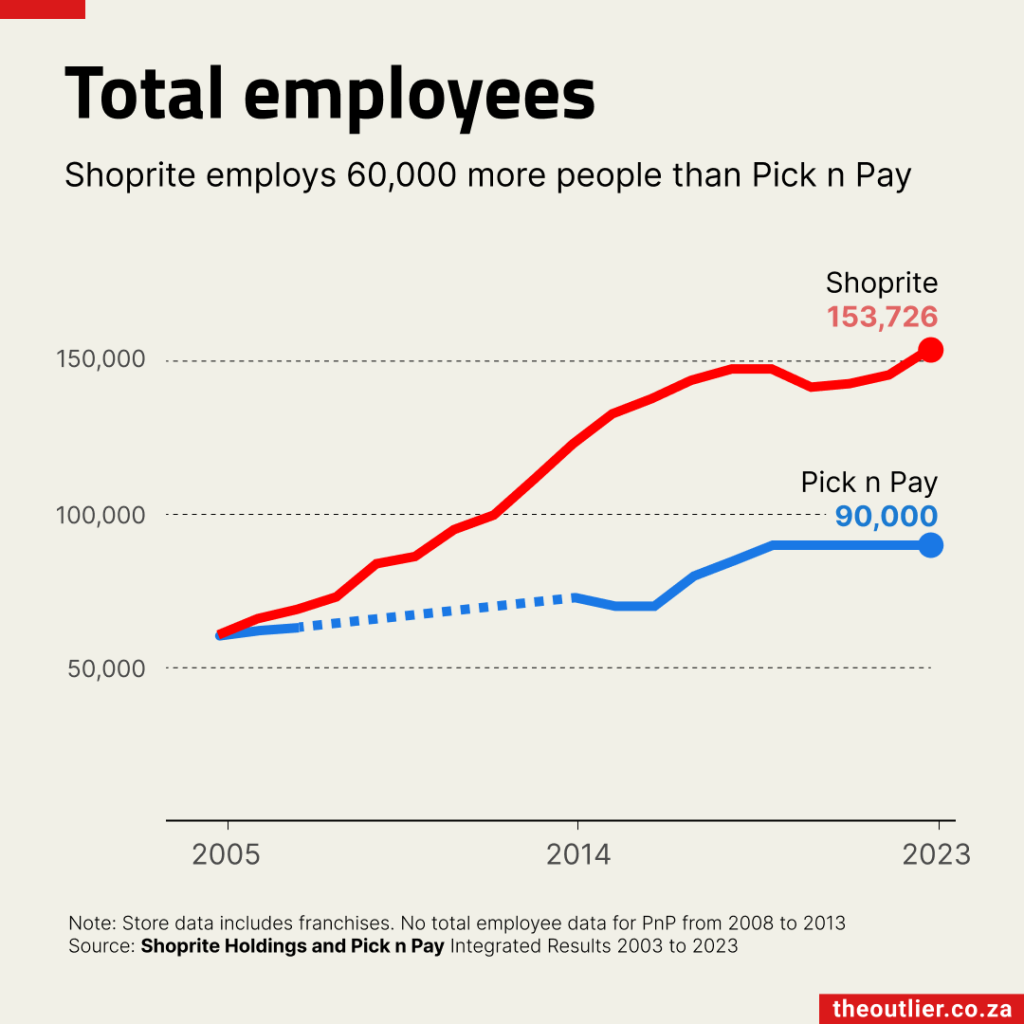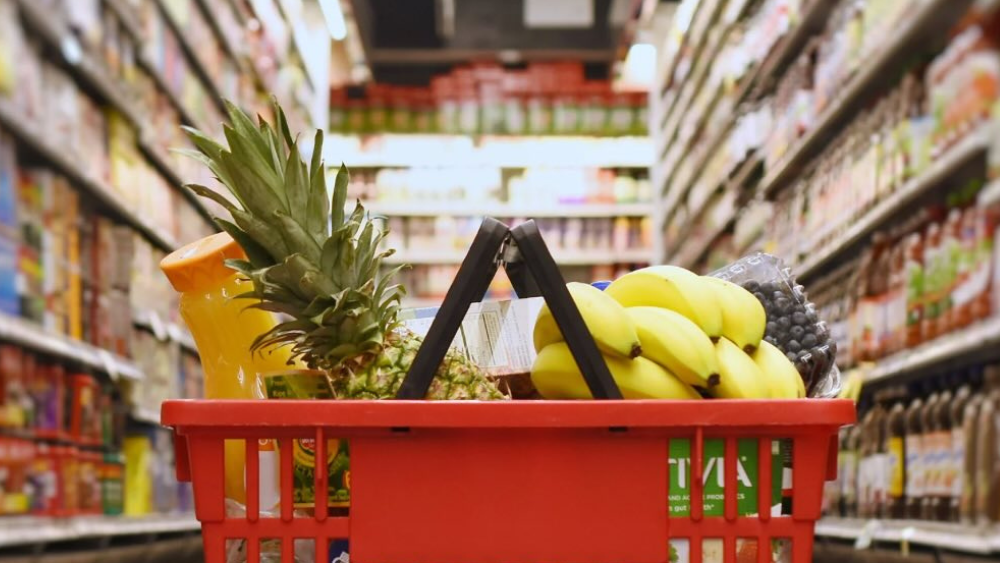In 2007, Shoprite and Pick n Pay were on par in almost every respect. They had roughly the same revenue and employed the same amount of people (~60,000). The only difference was that Shoprite had more stores: 1,180 versus Pick n Pay’s 762 stores.
Just over a decade later, things are very different. Shoprite started pulling ahead of Pick n Pay in 2008 and has since been rapidly increasing its dominance of the mostly grocery sector by most metrics, including the number of stores, revenue, employees and even African footprint, making it the biggest supermarket chain in Africa.
Revenue
In 2023 Shoprite reported an annual revenue of R215-billion, which is R106-billion more than Pick n Pay for the same period.
Take a moment to absorb that number. That means that Shoprite makes more than R4-billion a week in revenue, or nearly R600-million a day.
Those are eye-watering numbers and even people inside Shoprite seem awed by the success.
I joined Shoprite in ’97, and in those days, it took 19 years to do R10-billion in revenue. Today, we do R10-billion in revenue every 15 days
Shoprite CEO Pieter Engelbrecht

Stores
Except for a brief time in the early 2010s, Shoprite always had more stores than Pick n Pay, but over the past 3 years, it has been on a new store drive.
Started as an 8-store family franchise in the Western Cape in 1979, Shoprite now has more than 3,500 stores and is adding a new store every day. Between 2014 and 2023 stores (including franchises) increased from 1,581 to 3,543. At the same time, Pick n Pay went from 1,128 to 2,204 stores.
Note: In the charts, we’ve tried to get the latest numbers wherever possible but with such rapid growth even these are likely to be slightly outdated.

Employees
In 2023, Shoprite employed 153,726 employees, more than 60,000 more than Pick n Pay. In its most recent quarterly report, Shoprite reported that employee numbers are now over 160,000, more than 7,000 higher. This makes Shoprite the largest employer in South Africa after the government. Pick n Pay’s employee numbers have been relatively static since 2019.

Home deliveries
Shoprite’s Checkers Sixty60 and Pick n Pay’s ASAP delivery apps have both made large inroads into South African culture. It’s difficult to get exact numbers on home deliveries and app downloads but from what we do know it seems Checkers Sixty60 might be slightly ahead with its service covering 505 locations versus Pick n Pay’s 400.
Both services each claim more than 4-million downloads of their apps. In its 2023 integrated report Pick n Pay reported ‘over 4-million installs’ while Checkers Sixty60 claimed in a recent promo video that its app had been downloaded 4.5-million times.
Moving into Africa
While almost 90% of Shoprite’s stores are in South Africa, it does have a presence in 9 other countries on the continent, including Namibia (163 stores), eSwatini (62) and Zambia (52). Almost all of these are in Southern and Eastern Africa but it does have 7 stores in Ghana. Until 2020 Shoprite also had stores in Nigeria, but it sold them to local operator Ketron in August that year.
More than 90% of Pick n Pay’s stores are in South Africa. The remaining stores are in 7 countries, including Zimbabwe (72) and Namibia (35).

Leveraging customer numbers
As strong as Shoprite is now there is a looming threat to all retailers: the launch of Amazon in South Africa later this year.
Shoprite’s one major advantage is its already established customer base. In its latest quarterly statement, the company says it has almost 30-million members on its customer platform, which includes its Xtra loyalty programme and Checkers Sixty60, and customers are swiping their cards more than 2,500 times a minute.
Shoprite has also invested heavily in AI technologies and is now using AI to set optimised pricing and promotions across its network. BusinessLive recently reported that Shoprite was making up to 400-million calculations every 30 minutes across more than 40,000 stock items to calculate optimal prices.
Shoprite may be Africa’s largest supermarket but it is also certainly one of the continent’s largest data operations as well, which will give it a firm foothold against competitors like Amazon.
Notebook
- Shoprite Holdings’ media room
- Pick n Pay 2023 Integrated Report [PDF]
